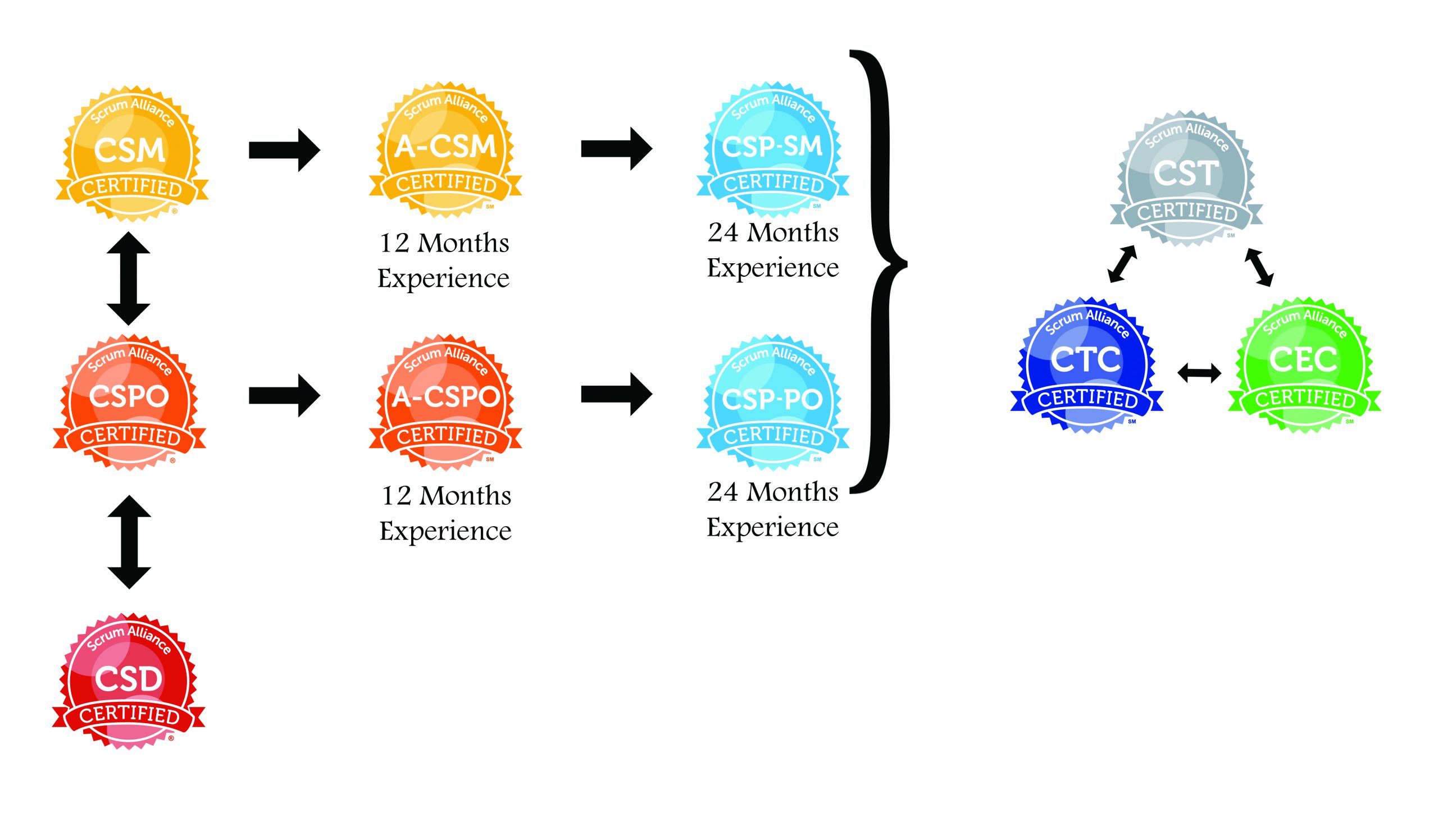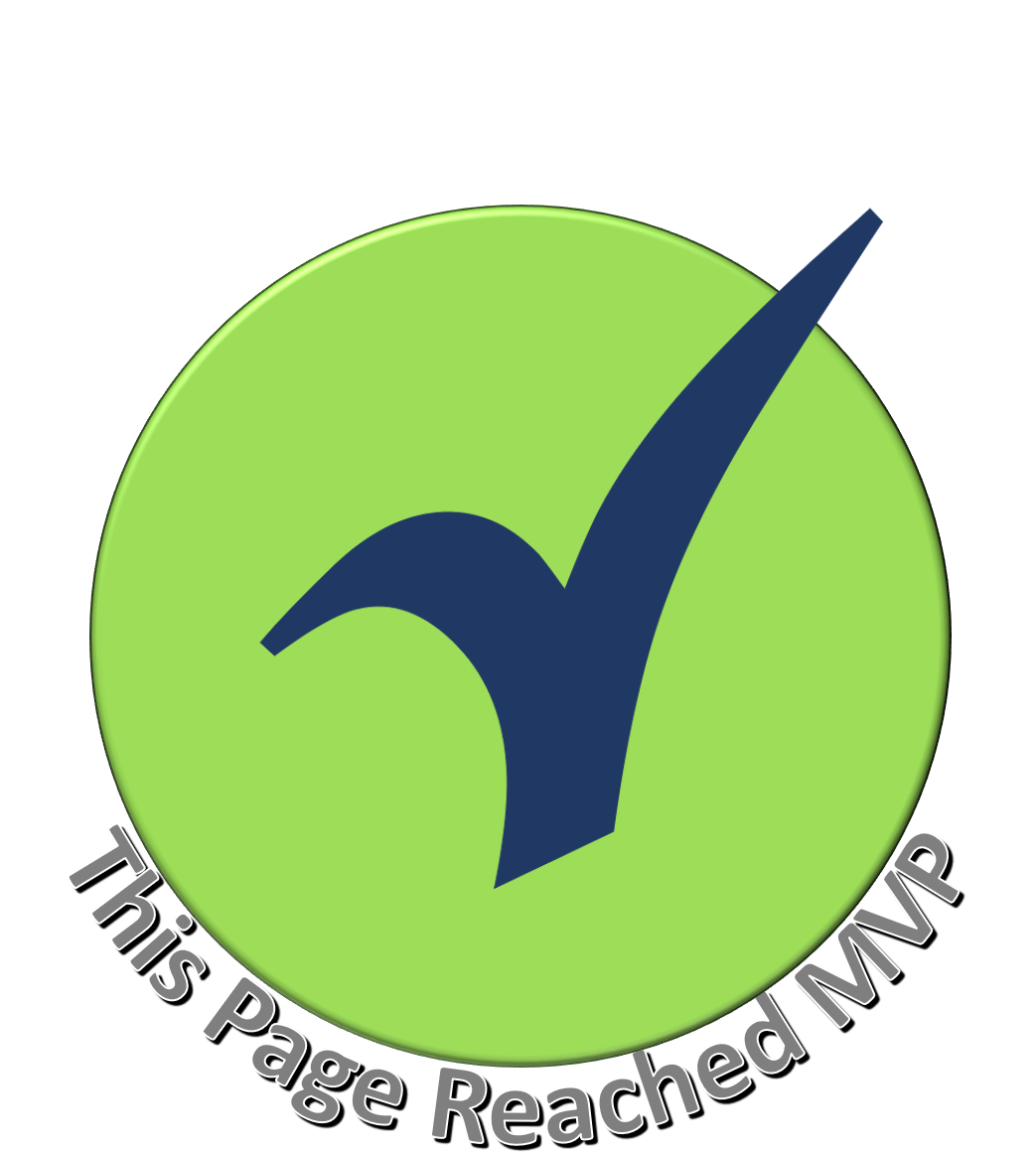What Are: Scrum Certifications
Scrum Certifications are intended to be used by people who have a certain level of knowledge about Scrum, and have proven it to the Scrum Community. For some certifying organizations, written examinations must be passed. For other organizations, training is enough. And, for other organizations, well… certification is easily attained through transfer of funds.
Scrum Alliance
Scrum alliance was the first Scrum certification body, and remains the only non-profit certification body within the entire Agile community. Scrum Alliance uses their funds (derived from each certificate issued, and renewals of certifications) to offer a rich community of Scrum enthusiasts world-wide. This community organizes annual Global Scrum Gatherings (that anyone may attend), sponsors regional and local Scrum User Groups, and offers a network of experienced professionals who help others find work as Scrum Masters, Product Owners, Coaches and Trainers.

Certified ScrumMaster (CSM)© – Beginner Level
This certification is intended to build a foundation of Scrum and Scrum Mastery knowledge for interested individuals. Contrary to the word ‘Master’ in the name of the certification, this cert doesn’t bestow the license of ‘Master of Scrum’ on anyone. It merely conveys that the certified person has been taught Scrum by a trusted expert (a Certified Scrum Trainer) in the Scrum Community; that this person was able to stay awake for 2 days during an in-person class; that this person was able to pass a VERY simple exam.
Certified Scrum Product Owner (CSPO)© – Beginner Level
Much like the CSM© class, the CSPO© class is an introduction to Product Ownership. But, because the trainer doesn’t need to spend a lot of time teaching the class what Scrum is, the class focuses more on the responsibilities of the Product Owner, and practicing techniques that Product Owners use.
Certified Scrum Developer (CSD)© – Beginner Level
Unlike the two certifications above, the CSD© class is an in-depth 3-day class into the use of eXtreme Programming practices (such as TDD, Pair Programming, CI/CD, etc.). This class conveys that the certificant has deep knowledge in what it means to be a Development Team member on a software development Scrum Team. This certification also requires 2 additional days of training on Scrum Fundamentals (the CSM© and CSPO© classes can both fill this requirement).
Advanced – Certified ScrumMaster (A-CSM)© – Beginner Level
The A-CSM is no joke. This certification shows that the certificant has at least 1 year of experience as a Scrum Master and, more importantly, this person is dedicated to learning more about the craft, and sharing what they’ve learned with others. The A-CSM class (when delivered as a 2 or 3-day class) is a short, but in-depth, class on the skills that Scrum Masters have created and cultivated for many years. Almost none of this class focuses on the Scrum Framework. The vast majority of this class is focused on teaching, or having the students demonstrate, Scrum Master techniques.
Advanced – Certified Scrum Product Owner (A-CSPO)© – Beginner Level
Much like the A-CSM© class, the A-CSPO© class is an in-depth exploration into Product Owner techniques and their influences throughout Agile organizaitons. This certification requires at least 1 year experience as a Product Owner.
Certified Scrum Professional – ScrumMaster (CSP-SM)© – Intermediate Level
There aren’t a ton of these certification opportunities offered as classes. When you find them, they are often 3-Day classes. More often, you will find this certification offered as a distance learning, or virtual learning, engagement with a Certified Scrum Trainer, over a period of several months. The CSP-SM is reserved for those truly on a journey to learn as much as they can about Scrum Mastery. As described on the Scrum Alliance website, this is the pinnacle certification for Scrum Masters. This certification requires at least 2 years of experience as a Scrum Master.
Certified Scrum Professional – Product Owner (CSP-PO)© – Intermediate Level
There aren’t a ton of these certification opportunities offered as classes. When you find them, they are often 3-Day classes. More often, you will find this certification offered as a distance learning, or virtual learning, engagement with a Certified Scrum Trainer, over a period of several months. The CSP-PO is reserved for those truly on a journey to learn as much as they can about Product Ownership. As described on the Scrum Alliance website, this is the pinnacle certification for Product Owners. This certification requires at least 2 years of experience as a Product Owner.
Certified Scrum Trainer (CST)© – Guide Level
The CST is the goal of many Scrum Masters and Product Owners in the community, but the road to becoming a CST is extremely long and difficult. Without going into the prerequisites (they change annually), the CST is reserved for the experts in the Scrum community who truly have the Scrum knowledge, and the ability to creatively teach others, about where Scrum came from, what’s so great about it, and where it could go in the future. CST’s may teach all of the Beginner and Intermediate level certifications listed above, but are initially only licensed to teach the CSM class.
Certified Team Coach (CTC)© – Guide Level
The Team Coach, just as it sounds, coaches Scrum Teams (including the Scrum Master) in how to operate as a self-organizing Scrum team. CTC’s can coach several teams at once, and even coach teams of teams, if needed. Through a long-term mentoring relationship with a single Scrum Master, CTC’s can betstow the CSM certificaiton on their prodigy.
Certified Enterprise Coach (CEC)© – Guide Level
The Enterprise Coach coaches from the executive level(s) down to about the Program level (teams of teams) in how to operate as an Agile organization embracing Scrum (and possibly other Agile approaches). CEC’s also lead Agile transformations/adoptions and help organizations with long-term Agile product development (product road mapping at the highest levels).
Scrum.org
Founded by one of the co-founders of Scrum Alliance, Ken Schwaber, Scrum.org is almost a mirror copy of Scrum Alliance. Some key differences: Scrum.org is NOT a non-profit organization – it is run as a company with a focus on generating as much revenue as possible; Scrum.org does not hold annual conferences for its members; certifications through Scrum.org do not require training from their designated trainers (Professional Scrum Trainers – PST).
Professional Scrum Master I (PSM I)
This certification is intended to be the beginner level of Scrum Mastery. Refer to CSM for a description.
Professional Scrum Master II (PSM II)
This is an intermediate level Scrum Master certification. Refer to the A-CSM description above.
Professional Scrum Master (PSM III)
This certification is generally only attempted by those wishing to become Professional Scrum Trainers. This is not exactly the same as the CSP-SM, from Scrum Alliance, but it’s close.
Professional Scrum Product Owner I (PSPO I)
This certification is intended to be the beginner level of Product Ownership. Refer to CSPO for a description.
Professional Scrum Product Owner II (PSPO II)
This is an intermediate level Product Owner certification. Refer to the A-CSPO description above.
Professional Scrum Trainer (PST)
The PST is allowed to teach Scrum certification courses for Scrum.org. These classes are not required for certification, however. All certifications from Scrum.org can be attained through purchasing the right to examination, and passing that examination process.
Other Scrum Certification Companies
Almost annually, new Scrum certification companies are created and continue to confuse people trying to break into the world of Scrum. Scrum Alliance and Scrum.org are the only two certification bodies that truly focus on the original Scrum defining document – the Scrum Guide. All others have created a skewed definition of what Scrum is, and in a self-serving manner, have created certifications meant to gouge consumers and spread false-Scrum throughout the world of work.
PLEASE! If you encouter people contemplating certification through an organization that is not Scrum Alliance or Scrum.org, guide them toward one of these two companies. It saves us (true Scrummers) a lot of work explaining how they’ve been duped.

